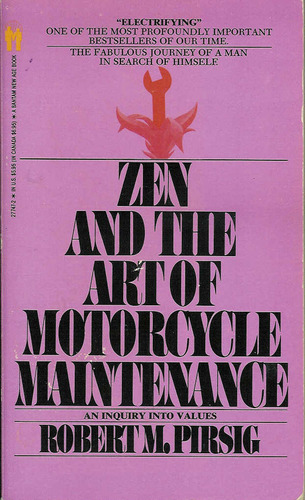Our July 2017 Newsletter focused on key insights for entrepreneurs offered by Robert Pirsig in “Zen and the Art of Motorcycle Maintenance. If you have not had a chance to read it I would encourage you to put it on your summer reading list.
Newsletter July 2017: Zen and the Art of Motorcycle Maintenance
This blog post summarizes our July 2017 newsletter: you can subscribe to the monthly SKMurphy newsletter.
If you have not read Zen and the Art of Motorcycle Maintenance” by Robert Pirsig, I would encourage you to add it to the top of your summer reading list. It offers a valuable perspective on both debugging problems in your startup and your life. I first read it in high school and was profoundly affected by it. I re-read it every few years and am surprised by the insights I overlooked. I have actually blogged about it five times over the years and I want to use this newsletter to focus on three key insights that Pirsig offered.
- Debugging Your Startup Requires Gumption and Piece of Mind
- How to Organize an Experiment Log for Exploring and Debugging
- Discerning the Future
 Debugging Your Startup Requires Gumption and Piece of Mind
Debugging Your Startup Requires Gumption and Piece of Mind
- “A person filled with gumption doesn’t sit around dissipating and stewing about things. He’s at the front of the train of his own awareness, watching to see what’s up the track and meeting it when it comes. That’s gumption.”
- The gumption-filling process occurs when one is quiet long enough to see and hear and feel the real universe, not just one’s own stale opinions about it.”
- “An adequate supply of gumption is the first and most important tool. If you haven’t got that you might as well gather up all the other tools and put them away, because they won’t do you any good.
- “The ultimate test is always your own serenity. If you don’t have this when you start and maintain it while you are working you are likely to build your personal problems right into the machine itself.”
All quotes from Robert Pirsig in “Zen and the Art of Motorcycle Maintenance.” Here are two related blog posts:
How to Organize an Experiment Log for Exploring and Debugging
“The logical statements entered into the notebook are broken down into six categories:
(1) statement of the problem,
(2) hypotheses as to the cause of the problem,
(3) experiments designed to test each hypothesis,
(4) predicted results of the experiments,
(5) observed results of the experiments and
(6) conclusions from the results of the experiments.”
Robert Pirsig in “Zen and the Art of Motorcycle Maintenance“
I have used this passage as point of departure for two different blog posts:
Discerning the Future
The Ancient Greek perspective of time: they saw the future as something that came upon them from behind their backs with the past receding away before their eyes. When you think about it, that’s a more accurate metaphor than our present one. Who really can face the future? All you can do is project from the past, even when the past shows that such projections are often wrong. And who really can forget the past? What else is there to know? What sort of future is coming up from behind I don’t really know. But the past, spread out ahead, dominates everything in sight.”
Robert Pirsig in “Zen and the Art of Motorcycle Maintenance“
The risk is that the future has arrived but is “unevenly distributed” so we reject the harbingers as outliers.
“We build up whole cultural patterns based on past ‘facts’ which are extremely selective. When a new fact comes in that does not fit the pattern we don’t throw out the pattern. We throw out the fact.”
Robert Pirsig in “Zen and the Art of Motorcycle Maintenance“
I used these quotes as points of departure for Discerning the Future
Summer Reading Special Offers
Four Free Books Also Worth Reading
- Seth Godin’s “Bootstrapper Bible“
- Abbot Stringham and Lynch “Starting a Business in Silicon Valley“
- Venture Hacks’ “Pitching Hacks“
- Albert Savoia’s “Pretotyping“
Take Part in a Discussion of “Anything You Want”
Our Peer Advisory Boards will be discussing one chapter from “Anything You Want” for our July and August meetings. Please let me know if you are in Silicon Valley and would like to take part in a session. If you are interested but not in Silicon Valley please let me know and I will set up a Zoom session for a group discussion in July and August.

 Debugging Your Startup Requires Gumption and Piece of Mind
Debugging Your Startup Requires Gumption and Piece of Mind